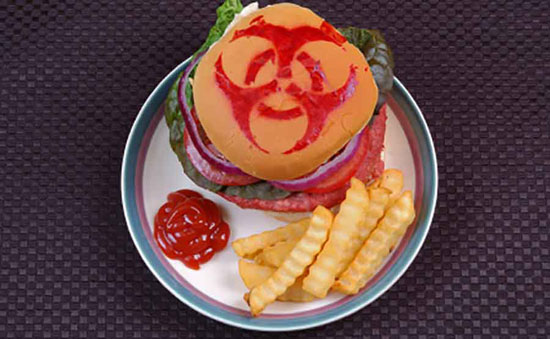Fast Food Burger = Fast Body Disruption
If you’ve ever wondered how long it takes for a fast food burger to disrupt your body’s system, Readers Digest has figured it out for you. Even eating one fast food burger has an immediate detrimental effect on your body.

Just to start with, a single quarter-pound patty has more than 500 calories, 40 grams of carbs, 10 grams – or nearly 3 teaspoons – of sugar, 1,000 milligrams of sodium and 25 grams of fat.
Within a few hours of eating it, fast food then impairs your arteries and elevates triglycerides and fatty acids in your bloodstream.
Additionally, a study showed that people who got at least 35 percent of their calories from fast food in a 24-hour period had higher levels of phthalates in their urine than those who had not consumed any fast food.
Researchers have identified two phthalates in particular in fast food, DEHP and DiNP, chemicals that are used to make plastics flexible. Used in food packaging and food-processing machines, the phthalates are absorbed into the food products and enter your body when you consume the contaminated food.
Studies show that exposure to phthalates can damage your liver, kidneys, lungs and reproductive system, particularly the developing testes of prenatal and neonatal males. Pregnant women and young children are at particularly high risk.
These endocrine-disrupting chemicals aren’t confined to your Burger King burger, however. You can also find them in foods at pizza and sandwich shops, coffee shops like Starbucks and other “casual dining” restaurants.
If you protest that it’s hard not to crave a burger or a latte or pizza, your feelings can be validated: Ending your consumption of fast food may not be as easy as you think. You may be addicted.
That’s because three hormones – dopamine, cortisol and serotonin – play important roles in emotional eating and food addiction. Cortisol regulates both your fight-flight-or-freeze response and your body’s use of carbohydrates, fats and proteins. This is why stress may make you want to devour junk food.
Here’s a fast-food fact, though: While just about any food can trigger pleasure, only foods high in refined sugar, salt and fat tend to lead to addiction when consumed regularly.
Fast food establishments are aware of this and have gone on the offensive, introducing some “healthy” food items, while often leaving out the details of what’s actually in these foods.
One look at a restaurant’s nutritional information sheet can easily tell you that a bacon ranch salad with buttermilk crispy chicken at McDonald’s has 1,120 mg of sodium and nearly a teaspoon of added sugar, or that two slices of a large meat lovers’ pizza with cheesy crust at Pizza Hut contains 1,820 mg of sodium, a teaspoon of sugar and 24 grams of saturated fat.
Most fast food items are high in sodium, because that translates to more flavorful food, but they’re also full of fake flavors, colorings and fillers such as thickening agents and extra carbs.
And when it comes to carbs, the sugar – oh my! Sugar is in nearly everything on the menu at your favorite fast food restaurant: It’s in the drinks, buns, sauces, desserts, but also in foods you would never suspect, such as salads.
Excessive consumption of sugar raises your uric acid levels, which can increase your risk for hypertension, fatty liver, kidney disease, elevated triglycerides and LDL, not to mention cardiovascular disease, insulin resistance, obesity, diabetes and preeclampsia in pregnant women. Given all that, when it comes to fast food you may want to think twice and just say “no.”
yogaesoteric
January 10, 2020
Also available in:
 Français
Français
